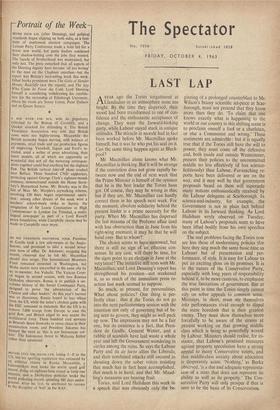LAST LAP
AYEAR ago the Tories torgathered at Llandudno in an atmosphere none too bright. By the time they dispersed, their mood bad been transformed to one of con- fidence and the enthusiastic acceptance of change. They were the forward-looking party, while Labour stayed stuck in antique attitudes. The miracle in morale had in fact been worked before Mr. Macmillan spoke himself, but it was he who put,his seal on it. Can the same thing happen again at Black- pool? Mr. Macmillan alone knows what Mr. Macmillan is thinking. But it will be strange if the conviction does not grow rapidly be- tween now and the end of next week that the Prime Minister is himself of the opinion that he is the best leader the Tories have got. Of course, they may be wrong in this; but if they are, Mr. Macmillan can hardly correct them in his speech next week. For the moment, absolute solidarity behind the present leader is a prime necessity for the party. When Mr. Macmillan has dispersed the last miasma of the Profumo affair (and with less obstruction than in June from his right-wing enemies), it may be that he will hand over. But to whom?
The choice seems to have narrowed, but there is still no sign of an effective con- sensus. In any case, will there be time, for the signs point to an election in June at the very latest? The initiative still rests with Mr. Macmillan; and Lord Denning's report has strengthened his position—not weakened it, as so much of the immediate press re- action last week seemed to suppose.
So much, at present, for personalities. What about policies? One thing is per- fectly clear: that if the Tories do not go into the next parliamentary session with the intention not only of governing but of be- ing seen to govern, they might as well pack up now. The impression may not be a fair one, but its existence is a fact, that Presi- dent de Gaulle, General Winter, and a rabble of scandals have laid waste a whole year and left the Government wandering in circles among the ruins. So says the Labour Party and its de facto allies the Liberals; and their combined attacks still succeed in shouting down the sober voices insisting that much has in fact been accomplished, that much is in hand, and that Mr. Maud- ling's measures are bearing fruit. Tories, said Lord Hailsham this week in a speech that was obviously only the be- ginning of a prolonged counterblast to Mr. Wilson's brassy scientific set-piece at Scar- borough, must not pretend that they know more than they do. 'To claim that one knows exactly what is happening to the world or our country in this shifting scene is to proclaim oneself a fool or a charlatan, or else a Communist and wrong.' These sentiments are admirable : but it is equally true that if the Tories' still have the will to power, they must come off the defensive and, both inside and outside Westminster, present their policies to the uncommitted middle no less effectively (if less science- fictitiously) than Labour. Far-reaching re- ports have been delivered or are on the way, and it may well be that government proposals based on them will supersede many notions enthusiastically received by the Labour delegates at Scarborough. In science-and-industry, for example, the Government is not in plain fact behind Labour in its iorward thinking. As Lord Hailsham wryly observed on Tuesday, many of Labour's proposals, seem to have been lifted bodily from his own speeches on the subject. The real problems facing the Tories now are less those of , modernising policies (for here they sing much the same basic tune as Labour) but of presentation and per- formance, of style. It is easy for Labour to put an exciting gloss on its promises. It is in the nature of the Conservative Party, especially with long years of responsibility behind it, to be more cautious, to emphasise the true limitations of government. But at this point in time the Tories simply cannot rely on sober appeals to common sense. Ministers, in short, must stir themselves into performances vivid enough to dispel the mere boredom that is their greatest enemy. They must show themselves more forcefully to be aware of the strains at present working on that growing middle class which is being so powerfully wooed by Labour. Ministers should realise, for in- stance, that Labour's promised measures against property speculation have a strong appeal to many Conservative voters, and that middle-class anxiety about education is desperately acute. 'Nothing,' as Burke observed, 'is a due and adequate representa- tion of a state that does not represent its ability as well as its property.' The Con- servatiVe Party will only prosper if that is seen to be the basis of its Conservatism.










































 Previous page
Previous page